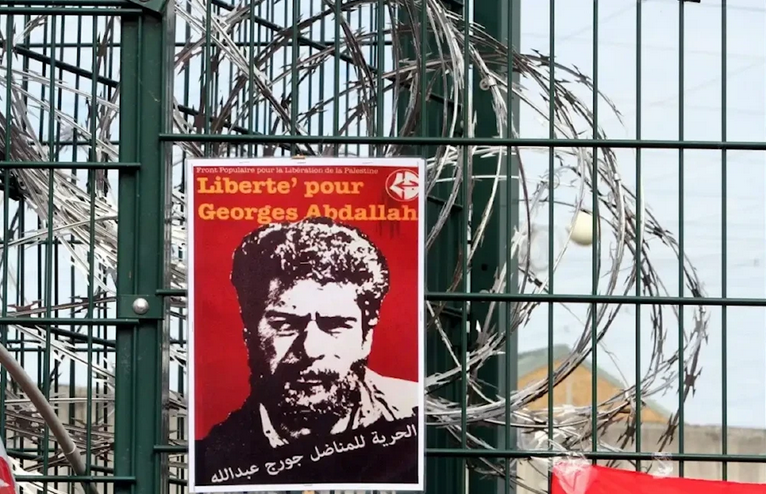
Georges Abdallah, the Lebanese revolutionary imprisoned in France, sent a message on the occasion of Palestinian Prisoners’ Day, affirming that celebrating this day aims above all to “confirm our duties toward the prisoners, loudly and clearly,” as well as to “include their liberation in the general dynamic of our ongoing struggles.”
Abdallah said that this day also aims to “encourage the lively revolutionary forces and their resisting vanguards to take all necessary measures to practically express our definite determination to liberate our comrades from the grips of their jailers.”
He stressed that thousands of prisoners who have been imprisoned for many years, and some for several decades, “reflect today, more than ever, the resistance of the Palestinian people in its various forms” against the Israeli occupation.
Additionally, Abdallah emphasized that the current Israeli government, “more than any previous government, cannot but intensify repression and try to expand the destruction of everything Palestinian,” especially anyone who joins the collective will of the Resistance.
He pointed out that the heroes of the revolutionary struggle, especially those who embodied the collective will of the Resistance (referring to the prisoners), are “the preferred targets of extermination policies that fascists from all spectra rush to implement, especially as the [ongoung] genocide makes it easy to do so.”
In this context, Abdallah called on international movements in solidarity with the Palestinians to take this reality into account, explaining that we are “dealing with a genocide unfolding in front of everyone, not in the hidden corners of secret [detention] camps,” which is being witnessed by hundreds of millions of people around the world for the first time in human history.
While emphasizing the special status prisoners enjoy in the Palestinian collective memory, he also noted that “the resisting prisoner, alongside the martyr, is someone found in every Palestinian family.”
Similarly, in his message, Abdallah urged for “vigilance and preventing the Zionist criminals from exterminating the revolutionary heroes in prisons” and for organizing solidarity initiatives in support of Palestine and its Resistance.
Abdallah also expressed his solidarity with the resistance fighters in Israeli prisons and in solitary confinement cells in Morocco, Turkey, the Philippines, and other places around the world.
Daqaa died standing
Earlier this month, following a nearly four-decade-long struggle in Israeli occupation prisons, Palestinian detainee Walid Daqqa was martyred inside Assaf Harofeh Hospital after a long battle with cancer.
Throughout his imprisonment, Daqqa endured numerous forms of mistreatment, torture, and notably, medical negligence. The occupation entity rejected his release on health grounds despite his mounting illnesses and calls by international humanitarian organizations.
The Lebanese revolutionary figure pointed out, in this context, that death due to medical neglect “has become the [leading reason for martyrdom] in Israeli prisons, especially in the al-Naqab prison, where Gaza detainees are held.”
He pointed to the constant expressions of solidarity with him [Daqqa] and other imprisoned freedom fighters in Israeli prisons, the calls and appeals to support them, and the initiatives that were aimed at extracting the martyr, whose health condition was critical, from the clutches of his criminal jailers.
However, these efforts were not sufficient to overcome the stubbornness of Police Minister Itamar Ben-Gvir and his fellow jailers and judges, as Abdallah emphasized in his message.
In his letter, Georges Abdallah affirmed that martyr Daqqa is a symbol of Palestinian Resistance. “He did not surrender or back down in any way during decades of captivity in the prisons of the occupation, defying torture, deprivation, isolation, and illness, in addition to blocking his messages and writings.”
“Our Walid died standing on his feet,” he said, stressing that the martyr “will remain alive forever in our hearts and in the minds of the masses of people and fighters taking part in this saga of Resistance,” along with all those who were martyred before him and after him, “as beacons illuminating the path of resistance, liberation, and freedom.”
Abdallah has so far served 38 years in prison, which makes him the longest-held prisoner in Europe. He was accused of assassinating US and Israeli diplomats and was sentenced based on these accusations.
He completed the minimum portion of his life sentence in 1999, but French authorities denied his eight parole requests. The judiciary agreed several times to these requests, given that the French Interior Ministry would deport him, but that decision was never taken.
Over the years, leftist MPs and human rights organizations, such as the Human Rights League (LDH) and even the French intelligence chief, called for his release.
Al Mayadeen